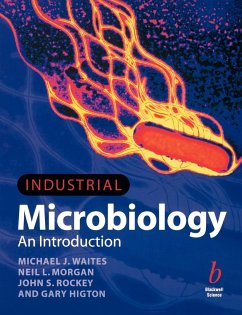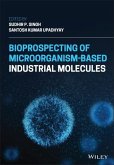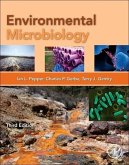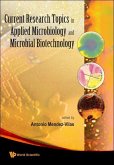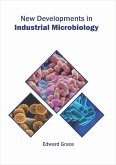Of major economic, environmental and social importance, industrial microbiology involves the utilization of microorganisms in the production of a wide range of products, including enzymes, foods, beverages, chemical feedstocks, fuels and pharmaceuticals, and clean technologies employed for waste treatment and pollution control.
Aimed at undergraduates studying the applied aspects of biology, particularly those on biotechnology and microbiology courses and students of food science and biochemical engineering, this text provides a wide-ranging introduction to the field of industrial microbiology. The content is divided into three sections:
key aspects of microbial physiology, exploring the versatility of microorganisms, their diverse metabolic activities and products
industrial microorganisms and the technology required for large-scale cultivation and isolation of fermentation products
investigation of a wide range of established and novel industrial fermentation processes and products
Written by experienced lecturers with industrial backgrounds, Industrial Microbiology provides the reader with groundwork in both the fundamental principles of microbial biology and the various traditional and novel applications of microorganisms to industrial processes, many of which have been made possible or enhanced by recent developments in genetic engineering technology.
A wide-ranging introduction to the field of industrial microbiology
Based on years of teaching experience by experienced lecturers with industrial backgrounds
Explains the underlying microbiology as well as the industrial application.
Content is divided into three sections:
1. key aspects of microbial physiology, exploring the versatility of microorganisms, their diverse metabolic activities and products
2. industrial microorganisms and the technology required for large-scale cultivation and isolation of fermentation products
3. investigation of a wide range of established and novel industrial fermentation processes and products
Hinweis: Dieser Artikel kann nur an eine deutsche Lieferadresse ausgeliefert werden.
Aimed at undergraduates studying the applied aspects of biology, particularly those on biotechnology and microbiology courses and students of food science and biochemical engineering, this text provides a wide-ranging introduction to the field of industrial microbiology. The content is divided into three sections:
key aspects of microbial physiology, exploring the versatility of microorganisms, their diverse metabolic activities and products
industrial microorganisms and the technology required for large-scale cultivation and isolation of fermentation products
investigation of a wide range of established and novel industrial fermentation processes and products
Written by experienced lecturers with industrial backgrounds, Industrial Microbiology provides the reader with groundwork in both the fundamental principles of microbial biology and the various traditional and novel applications of microorganisms to industrial processes, many of which have been made possible or enhanced by recent developments in genetic engineering technology.
A wide-ranging introduction to the field of industrial microbiology
Based on years of teaching experience by experienced lecturers with industrial backgrounds
Explains the underlying microbiology as well as the industrial application.
Content is divided into three sections:
1. key aspects of microbial physiology, exploring the versatility of microorganisms, their diverse metabolic activities and products
2. industrial microorganisms and the technology required for large-scale cultivation and isolation of fermentation products
3. investigation of a wide range of established and novel industrial fermentation processes and products
Hinweis: Dieser Artikel kann nur an eine deutsche Lieferadresse ausgeliefert werden.
"In today's world, it is important that students understand thefundamentals, but it is also important that the application ofthese concepts be encouraged. Moreover, a vision of how conceptscan be applied often fuels thirst for basic knowledge. In thisrespect, Industrial Microbiology is a valuable text."Paul B Rainey, Times Higher Education Supplement, 29 November2002
"...fascinating overview of the metabolic diversity ofmicroorganisms and the key roles they play in inudstrialprocesses...an excellent text for undergraduate students. Thechapters are consistently well written and the figures and tablessupplement the text very well." Bob Sotak, E-Streams, vol 5, no.12, December 2002
"In view of the advent of 'modern' biotechnologies, the question'What is biotechnology?' has been asked and discussed broadlyduring the last decades. One of the best answers to define thoseactivities that characterize the utilization of microorganisms forthe production of enzymes and fermentation products isIndustrial Microbiology ... Thus, if you are interested inobtaining a rather sound and at the same time comprehensiveintroduction to enzyme and fermentation technology, including thenecessary basic knowledge of relevant micro-organisms, this textcould be a good choice." M Roehr, Acta Biotechnolgica, September2003
"...fascinating overview of the metabolic diversity ofmicroorganisms and the key roles they play in inudstrialprocesses...an excellent text for undergraduate students. Thechapters are consistently well written and the figures and tablessupplement the text very well." Bob Sotak, E-Streams, vol 5, no.12, December 2002
"In view of the advent of 'modern' biotechnologies, the question'What is biotechnology?' has been asked and discussed broadlyduring the last decades. One of the best answers to define thoseactivities that characterize the utilization of microorganisms forthe production of enzymes and fermentation products isIndustrial Microbiology ... Thus, if you are interested inobtaining a rather sound and at the same time comprehensiveintroduction to enzyme and fermentation technology, including thenecessary basic knowledge of relevant micro-organisms, this textcould be a good choice." M Roehr, Acta Biotechnolgica, September2003

